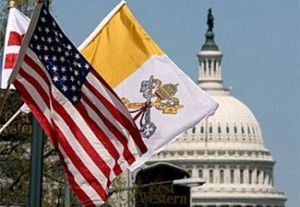 Today begins the U.S. Catholic bishops’ “Fortnight for Freedom,” a two-week period of prayer and social action organized in response to President Barack Obama’s contraception mandate. Rallies and prayer vigils for religious liberty are planned in nearly 100 dioceses across America. If the virtual blackout of last month’s anti-mandate lawsuits is any indication, though, national media coverage of these events may be scant and tinged with cynicism.
Today begins the U.S. Catholic bishops’ “Fortnight for Freedom,” a two-week period of prayer and social action organized in response to President Barack Obama’s contraception mandate. Rallies and prayer vigils for religious liberty are planned in nearly 100 dioceses across America. If the virtual blackout of last month’s anti-mandate lawsuits is any indication, though, national media coverage of these events may be scant and tinged with cynicism.
Driving that cynicism is the view that the Catholic bishops and their theologically conservative, morally traditional religious allies in this struggle are the last ones anyone should expect to find fighting for freedom. Freedom, after all, is the rallying cry for nearly every fashionable cause these groups typically oppose, from the “freedom to marry,” “freedom to choose” and “freedom to die,” to the freedom to watch pornography without restriction and to get birth control and morning-after pills without cost. How could the religious leaders accused most often of trying to restrict personal freedom — in particular, personal sexual freedom — be genuine defenders of liberty?
If freedom is defined merely as the license to do what you like — including reshaping social institutions and laws to maximize individual sexual autonomy — the notion of religious authorities as champions of freedom is indeed a hard sell. But if we take a more expansive view of freedom — one embraced by, say, our Founding Fathers — that notion makes more sense. And it becomes clear why religious liberty deserves its historic place as our “first freedom,” one that warrants greater deference than the endlessly proliferating new freedoms currently in vogue.
Religion merits the first and most prominent mention in our First Amendment because America’s Founders recognized what too many of its contemporary citizens have forgotten: that religion serves as our best bulwark against a totalitarian state. The transcendent perspective of religion — and, specifically, of the Judeo-Christian tradition that offered theological context for our founding documents — has reminded us from the earliest days of our republic that our rights come from God, not government; that partisan politics and political demagogues do not deserve our highest loyalty; and that laws must respect the inherent dignity of the person, including his freedom of conscience, to be legitimate.
From the abolition movement of the 18th and 19th centuries to the civil-rights movement of the 1960s and the pro-life cause today, religious views and voices have fueled the most powerful social reforms in our nation’s history. An America without a vibrant religious scene and vocal religious institutions would be a poorer nation — and its citizens far more susceptible to government overreach and manipulation. As Ross Douthat argues in his new book, “Bad Religion: How We Became a Nation of Heretics,” religion — and, specifically, the Christian orthodoxy so pilloried these days — fortifies us against the temptations to utopianism, unbridled nationalism and fanatical political ideologies that destroy individuals and entire nations.
As religious voices become increasingly marginalized in our public square, many Americans fear that we are succumbing to those very temptations. They worry about a federal government that seems eager to reduce freedom of religion to mere “freedom to worship” — a far more anemic and limited concept. They see unconstitutional coercion in the Obama administration’s insistence that Catholic employers pay for contraceptives, sterilization procedures and potentially abortion-inducing drugs that directly defy Catholic teachings. And they see ominous overtones in cases like that of Elaine Huguenin, an evangelical Christian who refused to photograph a lesbian commitment ceremony in 2006 and has found herself ensnared in legal battles ever since, with first the New Mexico Civil Rights Commission and now its Court of Appeals ruling that her religious-liberty rights are secondary to the right of same-sex couples to patronize the wedding photographer of their choice.
Today’s hot-button debates increasingly come down to a clash of competing freedoms and rights: the freedom to marry someone of the same sex versus the freedom to object to the redefinition of marriage, the right to choose abortion versus the right to life, freedom from hate speech versus freedom of speech. Not every freedom can be given equal weight. Some rights and liberties must be subordinated to others.
As we decide which belong at the top of our priority list, it’s worth reflecting again on the choices our Founding Fathers made. When faced with the temptation to enumerate every freedom imaginable in our nation’s founding documents, they took a leaner approach, emphasizing a few fundamental liberties without which the rest hardly mattered.
Religious liberty ranked among those. It was a wise and inspired choice, one we forget at our peril.



